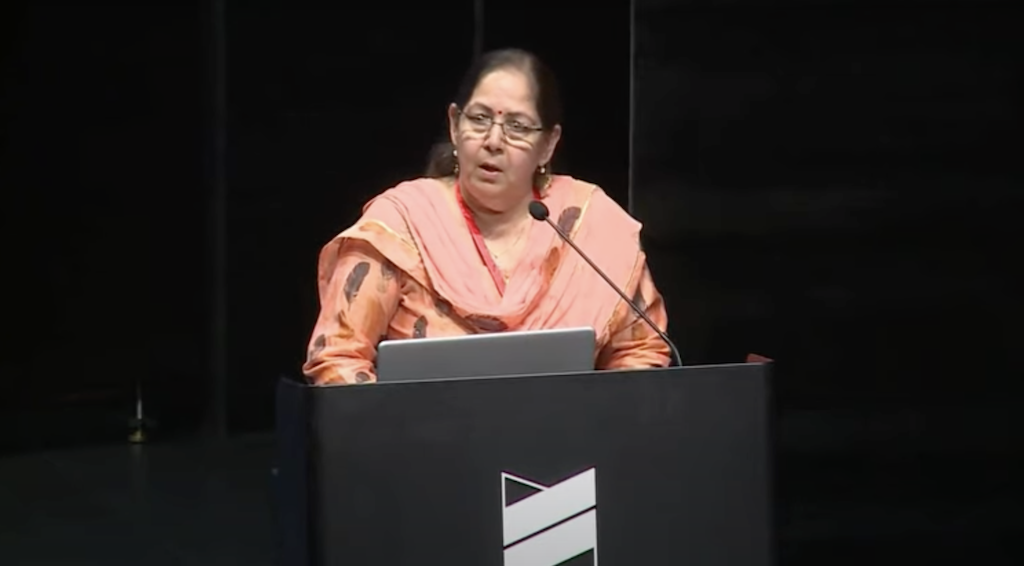Professor Anju Vali Tikoo, a distinguished academic with a career spanning over three decades, delivered a passionate and incisive keynote at the 8th India Land and Development Conference (ILDC). Her address, a clarion call for gender inclusivity in land governance, explored the intersection of law, policy, and lived realities for women in India. With her deep-rooted knowledge of legal frameworks and her personal experiences, Prof. Tikoo brought to light the systemic barriers that continue to marginalize women in matters of land ownership and decision making.
Setting the stage with her unique perspective as a Kashmiri academic displaced from her homeland, Prof. Tikoo highlighted the often-overlooked gender dimensions of land governance. She questioned the absence of women from conversations about land and power, pointing out how societal attitudes and systemic inequalities perpetuate this invisibility. "When we talk about land governance," she remarked, "the image that comes to mind is that of a farmer, a bureaucrat, or a politician—all men. Women are rarely, if ever, part of this picture."
Prof. Tikoo’s address underscored the critical role land plays in empowering women. She argued that land ownership is not just an economic asset but a source of security, autonomy, and dignity. However, despite legal advancements such as the 2005 amendment to the Hindu Succession Act, which granted daughters equal rights as coparceners, the reality remains bleak. Women often refrain from claiming their rightful share due to societal pressures and entrenched patriarchal norms. "How many women," she asked, "are inclined to ask their brothers for their share in ancestral property? The ground reality remains far removed from the promises of the law…why instead of giving dowry at the time of marriage we do not gift the daughter with a piece of land with ownership rights?”
Drawing attention to rural India, Prof. Tikoo painted a stark picture of female farmers who till the and but lack legal ownership. In cases where male family members migrate or pass away, women are left without the authority to make decisions about the land they labor on. This exclusion perpetuates cycles of poverty and dependency leaving women vulnerable to exploitation and displacement.
Her keynote also critiqued the legislative and policy gaps that undermine women’s rights. While acknowledging the progress made with reference to women’ share in land ownership under Sustainable Development Goal 5 (SDG 5) on gender equality, she questioned the exclusion ofagricultural land from women’s inheritance rights in the 2005 amendment. "Though women are declared coparceners," she noted, "but when it comes to agricultural land, they do not have any claim(s) recognised !"
Prof. Tikoo’s address was not merely a critique but also a call to action. She emphasized the need for a paradigm shift in attitudes toward women’s rights and a stronger alignment between policy and law. She argued for concrete measures such as reserving a specific percentage of land ownership for women and implementing laws with a focus on their lived realities. "We need to empower women as equal partners in land governance," she urged, "because without gender inclusivity, the broader goals of equity and justice will remain unfulfilled."
Concluding her speech, Prof. Tikoo left the audience with a sobering yet inspiring reflection: "Equality of status and equality of opportunity under art.14 of the Constitution remain far-fetched dreams for Indian women. But dreams, when pursued with the right tools and intentions, have the power to shape a better reality." Her words served as both a critique of the present and a vision for a more equitable future, urging policymakers, academics, and society at large to reimagine land governance through the lens of gender justice.
Prof. Tikoo’s keynote, a blend of legal acumen and personal conviction, resonated as a powerful reminder of the work yet to be done to achieve true gender equality in India’s land governance framework.

